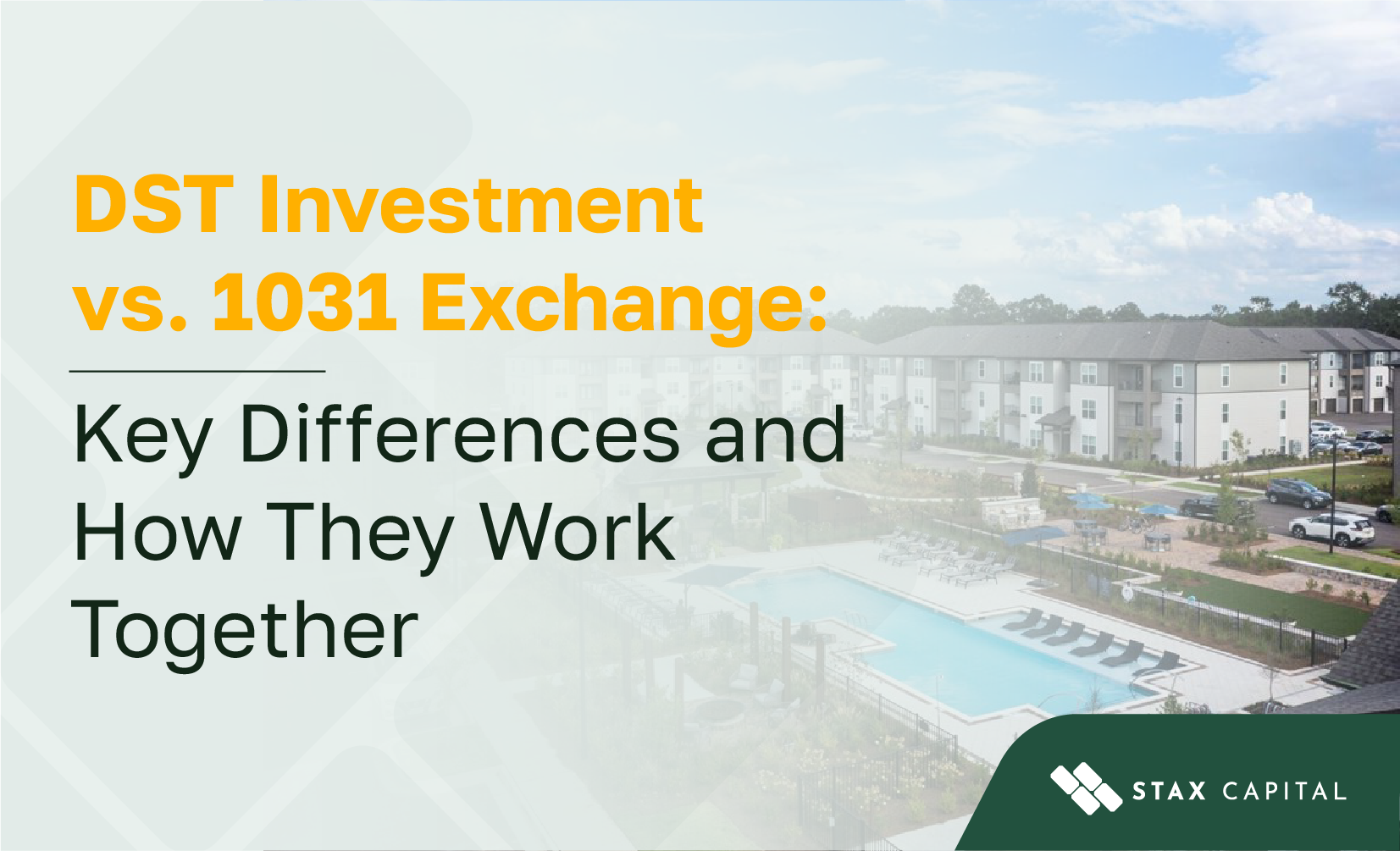721 Exchange vs 1031 Exchange: Which One is Right for You

If you’re looking to defer taxes on your real estate investment, you’ve probably come across the 721 Exchange and the 1031 Exchange. But which one is better for you? These two strategies are powerful tools for real estate investors, but they have their own unique advantages.
In this post, we’ll dive into the main differences between the 721 and 1031 exchanges and help you figure out which one can help you meet your financial goals.
What is a 1031 Exchange?
A 1031 Exchange may allow eligible real estate investors to defer capital gains taxes when they reinvest proceeds into a qualifying like-kind property, subject to IRS regulations and strict timelines. However, failure to meet these requirements could result in immediate tax liability.
Here’s how it works:
- You sell your property. You find a buyer and sell your property.
- You reinvest the proceeds. Within 45 days, you must identify the new property or properties you want to buy. Then, within 180 days, you must complete the purchase of that property.
- You defer the taxes. Capital gains tax deferral may be available if all IRS 1031 exchange requirements are met. However, investors should consult their tax professional to determine eligibility, as failure to meet IRS regulations could result in immediate tax obligations.
However, it’s important to note that this strategy requires you to keep your capital tied up in real estate. If you decide not to reinvest in property, you’ll be required to pay taxes.
What is a 721 Exchange?
A 721 Exchange is a strategy where you exchange your real estate for units in a UPREIT (Umbrella Partnership Real Estate Investment Trust). Instead of buying a new property, you give up your property in exchange for ownership in a REIT, which holds a large portfolio of properties.
Here’s how it works:
- You contribute your property to a REIT. Instead of selling it directly, you transfer your property to a REIT in exchange for operating partnership units (OP units).
- You hold the OP units. These units represent your share of the REIT. You don’t own the property directly anymore, but you benefit from the income the REIT generates.
- Deferred taxes: Like a 1031 Exchange, the 721 Exchange may allow you to defer capital gains taxes when you contribute your property to the REIT. You’ll only pay taxes when you eventually sell your OP units or convert them into REIT shares. Investors should seek professional tax advice before pursuing this strategy.
While this strategy offers great flexibility, it’s important to understand that you give up control of your property. The REIT handles all decision-making, and your income will come from the REIT’s distribution rather than direct rent.
Key Differences Between a 721 and a 1031 Exchange
Ownership Structure
A 1031 Exchange lets you swap one investment property for another while keeping full control. When you complete the exchange, you own the new property outright. That means you decide everything—who rents it, how much to charge, when to sell, and how to manage it.
A 721 Exchange works differently. Instead of trading one property for another, you contribute your property to a Real Estate Investment Trust (REIT) or a partnership. In return, you receive shares or Operating Partnership (OP) units. You no longer own the property itself—the trust or partnership does. The REIT’s management team handles all decisions, from tenant selection to rent pricing and maintenance.
In short, a 1031 Exchange keeps you in the driver’s seat, while a 721 Exchange shifts control to the REIT, offering a more hands-off approach to real estate investing.
Diversification
A 1031 Exchange lets you diversify your portfolio by swapping one property for another. If you already own different types of real estate—like residential, commercial, or industrial properties—you can use a 1031 exchange to adjust your holdings. But you still own and manage each property directly, limiting how much you can diversify based on your budget and management capacity.
A 721 Exchange takes diversification even further. Instead of owning a single property, you exchange it for shares in a Real Estate Investment Trust (REIT) or a partnership. This gives you instant access to a broad portfolio of properties across different sectors—like office buildings, apartment complexes, retail centers, and industrial parks. These properties are spread across multiple locations, reducing the risk of having all your money tied to one market.
With a 1031, you choose each new property yourself. With a 721, you gain exposure to a professionally managed, highly diversified real estate portfolio—without the responsibility of managing it yourself.
Responsibility
Owning real estate comes with big responsibilities. If your property sits empty, you’re the one covering the costs. If the roof leaks or the HVAC breaks, the repair bill comes straight from your pocket. Managing a property means dealing with tenants, maintenance, and unexpected expenses.
With a 1031 Exchange, you remain the active owner. You get full control, but you also take on all the risks and daily responsibilities of managing the property.
A 721 Exchange changes that. When you transfer your property into a Real Estate Investment Trust (REIT) or a partnership, you’re no longer responsible for maintenance, repairs, or tenant issues. The REIT’s professional management team handles everything. You still have an investment in real estate but without the headaches of being a landlord.
For investors seeking a passive approach to real estate, a 721 Exchange may be an option to consider. However, potential investors should evaluate the risks and tax implications before making a decision and consult with their financial and tax advisors.
Liquidity
When you invest in real estate, liquidity — or the ability to turn your investment into cash quickly — is usually limited. If you own physical property, selling it can take time. You need to find a buyer, negotiate a price, and wait for the deal to close.
With a 1031 Exchange, you’re required to reinvest the proceeds into more real estate. This means your money is tied up in physical property again, making it hard to access cash if you need it.
On the other hand, a 721 Exchange offers more liquidity. After exchanging a property, investors receive operating partnership (OP) units, which may later be converted into publicly traded REIT shares. If you need to access your cash, REIT shares may offer more liquidity compared to direct real estate holdings. However, these shares are subject to market risks, price fluctuations, and potential restrictions on sales. Consult with your financial advisor to understand liquidity limitations.
In short, if you want more control over your money and faster access to cash, a 721 Exchange may be a better option.
Exit Strategy
With a 1031 Exchange, your options are limited. If you ever want to cash out, you must either complete another 1031 exchange to defer taxes again or sell the property outright. If you sell, you’ll owe capital gains taxes on the profit.
A 721 Exchange provides an alternative exit strategy, allowing investors to exchange real estate for REIT shares. However, once REIT shares are sold, capital gains taxes become due, and investors lose the ability to defer taxes through future 1031 exchanges. Consult a tax professional to evaluate the tax consequences before selling REIT shares.
If you’re looking for an easier way to gradually exit real estate ownership while keeping access to your wealth, a 721 Exchange could be a smart move. However, investors should carefully evaluate tax implications and potential risks with the guidance of a qualified financial advisor.
When to Consider a 1031 Exchange?
A 1031 Exchange can be a great option for investors who want to stay involved with real estate directly. Here’s when it might make sense for you:
- You want to keep owning and managing real estate. If you enjoy the hands-on work of property management, dealing with tenants, and making decisions about your properties, a 1031 exchange lets you continue doing that. You’ll just swap your current property for another similar one.
- You want to defer taxes while acquiring new properties. If taxes from a property sale are a concern, a 1031 exchange allows you to defer paying capital gains taxes. This means more of your money stays working for you as you invest in new properties without taking a hit from immediate taxes.
- You’re comfortable with reinvesting in like-kind real estate. The 1031 exchange requires you to reinvest in similar property, which might limit your options. But if you’re okay with this restriction and you want to keep growing your real estate portfolio, this exchange is a solid option.
In short, if you’re focused on direct real estate ownership, tax deferral, and reinvesting in like-kind properties, the 1031 Exchange could be the right fit for you.
When to Consider a 721 Exchange?
A 721 Exchange can be a great choice for investors looking to make a shift in how they manage their real estate. Here’s when you might want to consider it:
- You want to transition from active to passive real estate investing. If you’re tired of the day-to-day management of properties—like finding tenants or handling maintenance—a 721 exchange allows you to pass on those responsibilities. You’ll trade your property for shares in a real estate investment trust (REIT), giving you a more hands-off approach.
- You seek income diversification and professional management. Instead of having all your eggs in one property basket, a 721 exchange gives you access to a broad portfolio of properties managed by professionals. It’s a way to diversify your investments across different sectors and locations without the burden of direct management.
- You prefer liquidity and easier estate planning. A 721 exchange provides more liquidity, since you can eventually convert your REIT shares into cash or easily transfer them. Additionally, estate planning becomes simpler, as your heirs can inherit shares in the REIT instead of dealing with the complexities of real estate properties.
In short, if you’re ready for passive income, professional management, and greater liquidity, the 721 Exchange might be the right strategy to help you shift gears in your investment journey.
Ready to Make the Choice?
Now that you understand the key differences between the 1031 and 721 exchanges, it's time to decide which path fits your investment goals. If you’re looking for control and property ownership, the 1031 exchange may be your best option. But if you’re seeking ease, diversification, and liquidity, the 721 exchange could be a game-changer.
Ready to take the next step? Reach out now, and let’s talk about which option is best suited to your investment strategy.



Share: